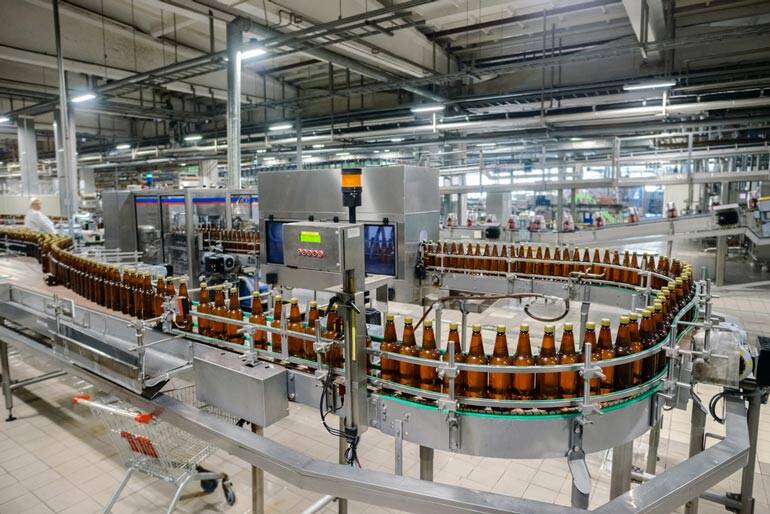Start 14-Day Trial Subscription
*No credit card required

The Role of Automation and Technology in Modern Breweries
Discover how automation and technology are transforming the brewing industry. From precise production control to inventory management, packaging, compliance, and recipe perfection, explore the innovative solutions that are reshaping the art and science of brewing.
As the art and science of brewing improves, so does the technology and innovation behind the scenes. We are living in an era in which sensors, algorithms and digital skills coexist with age-old customs.
The merger of automation and technology has ignited a revolution, reinventing how brewers optimize their production processes while adhering to the time-honored goal of making a terrific brew.
Production Efficiency & Consistency
Through the integration of automated systems, breweries can now meticulously monitor and regulate crucial variables such as temperature, pressure and fermentation stages in real time. This dynamic control not only ensures the consistency of product quality, but also minimizes the potential for human error, a factor that has historically led to batch inconsistencies.
It also aids in the precise management of each stage of the brewing process, optimizing resource utilization and minimizing waste. This equates to higher output and lower manufacturing costs. Furthermore, the capacity of these systems to work constantly without human involvement helps to shorter production cycles, allowing firms to respond quickly to rising demand.
Inventory Management
Positioned strategically within the brewing process laid out by Direct Air, collection devices continually oversee ingredient quantities, including malt, hops, yeast and additives. This data is seamlessly channelled into a centralized system, providing a real-time inventory snapshot that safeguards against unforeseen interruptions in brewing operations caused by shortages.
The technology does not end with tracking. Based on past data, manufacturing plans and even external factors such as seasonal demand fluctuations or future promotions, these systems may forecast consumption trends. This predictive power enables managers to alter their ordering and production methods proactively, avoiding overstocking and understocking issues.
Furthermore, it may result in more effective resource use. They may optimize their supply chain by precisely understanding what commodities are on hand and their consumption rates. This reduces waste, lowers storage costs and improves the utilization of industrial resources. Moreover, thorough raw material tracking ensures that only the finest-quality ingredients are utilized, adding to the overall perfection of the finished product.
Packaging & Bottling
Mechanical manufacturing lines are the most significant item today. They have substantially reduced the amount of labor that people must do and begun a new era of efficiency. These high-tech devices can perform complex tasks with pinpoint accuracy, ensuring that each bottle is filled to the exact level, firmly sealed, accurately branded and packed.
These computer-controlled devices operate at substantially quicker speeds than their manual counterparts. The consistent speed and rhythm improve performance, allowing beverage businesses to package larger volumes of beer in less time. This not only serves the demands of a growing market, but also allows businesses to respond swiftly to changes in demand without jeopardizing the quality of their products.
Traceability & Compliance
Maintaining accurate records of methods, ingredients, and production history is one of the most difficult tasks that brewers confront. This data is critical not just for internal quality control but also for establishing compliance with various regulatory agencies.
Businesses can employ technology developments to provide checks and balances to prevent deviations from set standards. If a parameter deviates from its set range, the system can provide alerts or make automatic modifications to bring the operation back into compliance. This real-time monitoring decreases the possibility of producing subpar or non-compliant batches, safeguarding the firm's brand and compliance.
Technology-enabled traceability also helps brewers with quality improvement projects. Analyzing historical data allows team leaders to identify trends, patterns and possible areas for development. Brewers may use this approach to fine-tune their recipes, optimise their processes, and continuously meet or exceed consumer expectations.
Recipe Management Systems
With this software, brewers can easily reproduce their most successful brews and maintain consistency across batches. This is especially important for breweries that produce a wide variety of products and want to ensure that each one meets their exact specifications.
These initiatives also provide companies the ability to experiment with new ideas and processes while developing new drinks. They may alter the quantity of the components and the parameters, simulate the results and make informed decisions about how the beer is manufactured. This degree of control and accuracy stimulates and enables brewers to experiment with flavor profiles and production techniques, which increases creative possibilities.
Furthermore, they make production easier by providing specific instructions for each stage of the manufacturing process. As a result, production is more consistent. Individuals will make fewer mistakes as a result of this, and there will be no need to keep records by hand because everything will be preserved electronically.
Summary
These technologies have altered the brewing environment by rethinking production processes, ensuring consistency in output and enhancing consumer involvement. The combination of IT and automation has increased corporate production as well as customer service, ushering in a new age in the art and science of brewing.



